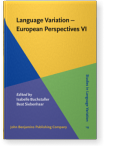Vowel raising and vowel deletion as sociolinguistic variables in Northern Greek
The research reported here is part of a longitudinal case study into the linguistic effects of de-urbanization, which is occurring in Greece due to severe economic recession. The overall aim of the analysis is to explore the way in which de-urbanization is affecting the evaluation and production of dialects in rural communities. In this paper, I present evidence that the features of unstressed vowel deletion and vowel raising are socially embedded in Northern Greek. Even though the usage of standard variants is very close to categorical, a quantitative comparison of the linguistic patterns of urban in-migrants who have returned to the rural community against the usage of speakers who have never left reveals that the use of standard variants indexes more advanced education and an orientation towards the urban lifestyle.
Article outline
- 1.Introduction
- 2.Methodology and results
- 3.Conclusion
-
Acknowledgements
-
References
